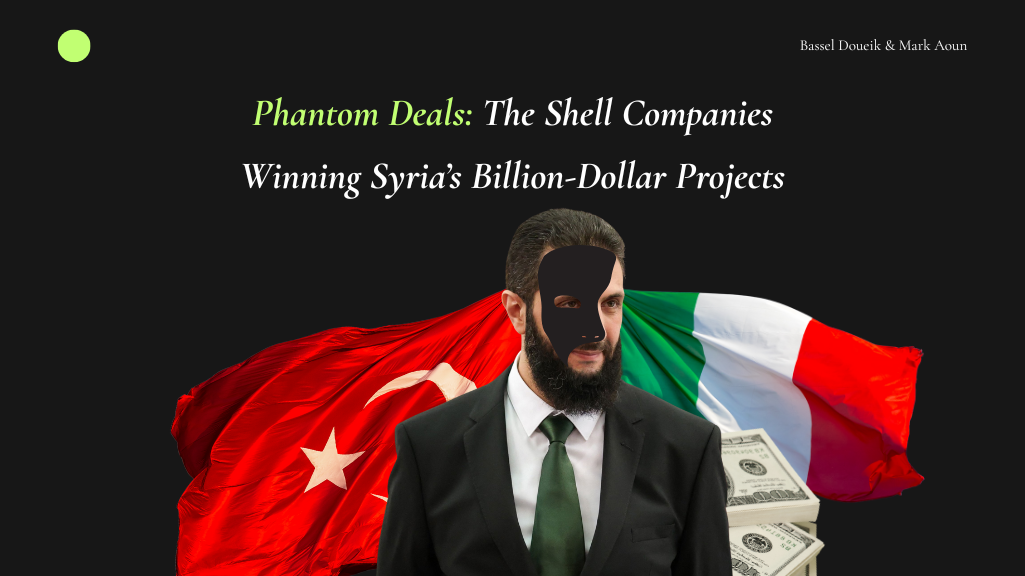


Phantom Deals: The Shell Companies Winning Syria’s Billion-Dollar Projects
August 11, 2025
A-
A+
Syria’s post-war reconstruction is being sold as a multi-billion-dollar opportunity for global investors, but beneath the promises lie troubling signs of opacity, inflated claims, and questionable due diligence. Truth Trend’s investigation into Turkish firm POLiDEF Mühendislik, reportedly tasked with building a new airport in Damascus, found no verifiable offices, employees, or credible proof of the high-profile defense partnerships it claims. A similar pattern emerges in the case of Italy’s UBAKO-I Srl, a one-employee firm awarded a $2 billion Damascus Towers contract despite reporting just €209,000 in annual revenue. Together, these cases highlight a reconstruction process plagued by shell-like entities, inflated credentials, and minimal due diligence, raising serious questions about transparency, accountability, and who truly benefits from Syria’s post-war rebuilding.
Turkiye’s POLiDEF:
The Sharaa-led government has signed several memoranda of understanding with companies interested in investing in the Syrian market. One such project involves the construction of a new airport in Damascus, with the Turkish company POLiDEF Mühendislik reportedly responsible for the infrastructure. According to open-source data, POLiDEF was established in Istanbul in 2021. The company claims to have carried out numerous projects in collaboration with major Turkish defense firms, including ASELSAN and HAVELSAN—both of which operate under the Turkish Armed Forces Foundation.
Company Basics & Registration
Turkish corporate registry searches should confirm essential details such as the official registration number, founding documents, shareholders, directors, registered capital, and the company’s stated purpose. However, as of now, no public filings or legal documents independently verify any substantial financial activity for the company.
Physical Presence
POLiDEF lists office locations in Beşiktaş and Üsküdar in Istanbul, as well as in Çankaya, Ankara. However, verification efforts using Google Maps and street view analysis reveal no signage or visible activity at these addresses. Additionally, there are no independent directory listings or known tenants associated with these locations, nor is there any media or government coverage confirming visits to or use of these premises.
Employees & Organizational Structure
There seems to be no verifiable information regarding employees, leadership, or job postings for POLiDEF Mühendislik. The company’s official website does not list any staff members or provide details about its organizational structure. Additionally, there are no publicly available records on platforms such as LinkedIn confirming the existence of employees or executives associated with POLiDEF.
Client & Partner Claims
ASELSAN is Turkey’s largest defense electronics company, specializing in advanced military and civilian technology systems. However, the claim of a partnership between POLiDEF and ASELSAN remains unverified. ASELSAN’s list of affiliates does not include POLiDEF.
HAVELSAN, another key Turkish defense and IT company, is also listed as a partner on POLiDEF’s website. Yet, as with ASELSAN, there is no external confirmation, through press releases, public records, or corporate disclosures, of a formal relationship between the two firms.
Based on the aforementioned investigation, POLiDEF Mühendislik exhibits multiple characteristics typical of a shell company. Despite its claims of involvement in significant infrastructure projects in Syria and partnerships with prominent Turkish defense firms like ASELSAN and HAVELSAN, there is no independent verification of these assertions. The company lacks a transparent corporate presence, with no verifiable registration documents, no visible or active offices at its listed addresses, and no publicly identifiable employees or leadership. Furthermore, the alleged partnerships with ASELSAN and HAVELSAN are unsubstantiated by any official records or announcements from these established firms. Taken together, these factors strongly suggest that POLiDEF Mühendislik may not be an operational entity, raising serious doubts about its legitimacy and pointing toward it functioning as a shell company.
Italy’s UBAKO-I Srl:
Syria awards $2B contract to Italian firm with €209K revenue. A small Italian company with one employee has landed Syria’s biggest reconstruction contract despite a massive capacity mismatch.
Why it matters
Syria’s $2 billion Damascus Towers deal with UBAKO-I Srl raises red flags about due diligence in the country’s reconstruction efforts, and fits patterns of opacity that have plagued post-conflict rebuilding worldwide.
The big picture
Syrian President Ahmad al-Sharaa signed 12 investment deals worth $14 billion on Aug. 6, including:
- $4B Damascus airport expansion (Qatar’s UCC Holding)
- $2B metro system (UAE’s national investment corp)
- $2B Damascus Towers project (Italy’s UBAKO-I Srl)
UBAKO-I Srl’s profile:
Annual revenue: €209,000 (2023)
Employees: 1
Registered capital: €16,000
Founded: June 2022
Previous largest project: €1.2M Dubai hotel contract
The math: Damascus contract is 1,667x larger than their biggest previous work.
Red flags in company profile
Website claims “25+ years experience” but company founded in 2022
Claims “1520+ colleagues” vs. 1 actual employee.
No verifiable LinkedIn profiles for executives Giovanni Rossi (CEO) and Alessia Conti (Head of Operations) despite claimed international operations.
Contains unprofessional placeholder text like “[Company Name]” and “[Year]”.
Claims “30+ projects completed globally” and “15 countries served” with minimal evidence.
Expert criticism
Osama Kadi (Syrian Economic Task Force): “Lack of transparency and widespread corruption within successive Syrian governments for five decades”.
Syrian architect Mazhar Sharbaji: Reconstruction committee “allows for the disbursement of money taken from reconstruction funds, explicitly to the military, police and security services”.
Syria’s reconstruction challenges – Pattern of concerns:
OCCRP found Syria’s reconstruction tax generated $900M since 2010 with “systematic diversion” to military purposes.
Human Rights Watch: Syrian government “systematically co-opts aid and reconstruction funding”.
Syrian investment law allows 100% foreign ownership with minimal due diligence requirements.
While the Damascus Towers project is legitimate, the contractor selection process exhibits multiple warning signs that echo documented reconstruction irregularities — raising questions about whether Syria’s new government has adequate safeguards against corruption.
Read More
-
Destruction and siege drive As-Sweida into a deepening humanitarian crisis
-
Is the Iranian regime in threat of collapse due to its economic challenges?
-
Tamara el-Zein: From Science Champion to Minister of the Environment
-
After Graham’s Beirut Visit: Tel Aviv Watches More Closely
-
Everyone is depending on the Lebanese Army, but can it deliver?